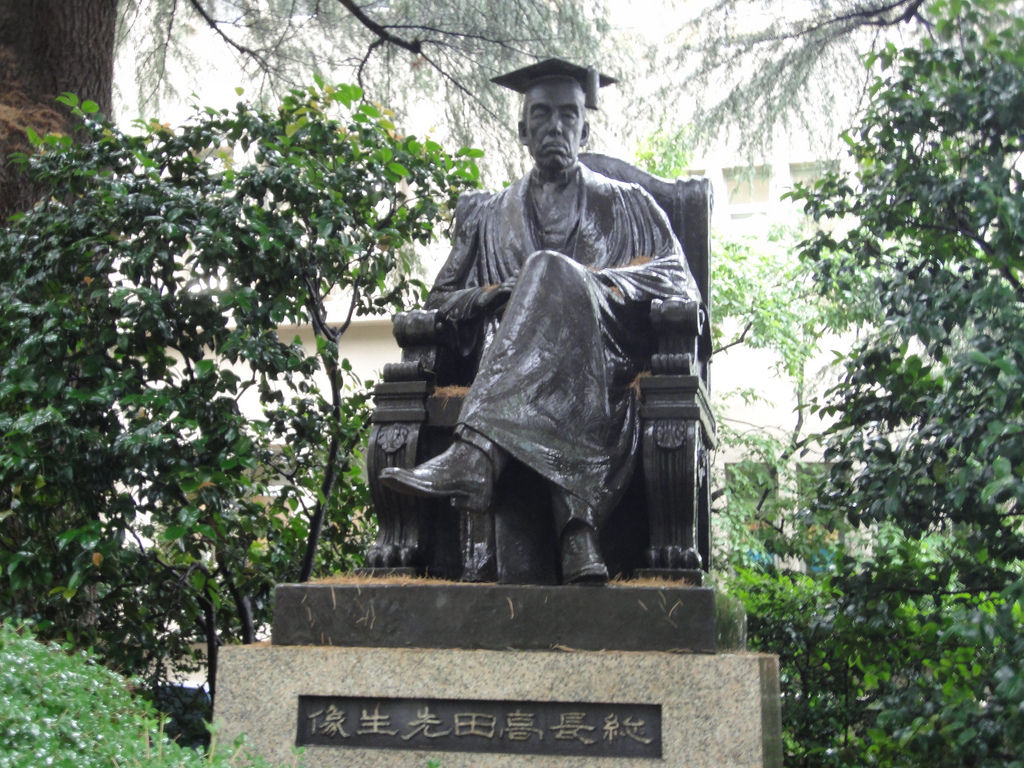
Statue of Takata Sanae at Waseda University. Photo © Dick Johnson, licensed Creative Commons Attribution.
Many universities in the United States have study abroad and exchange programs with universities in Japan that include housing, language studies, and cultural activities for three months to a year. Once you arrive in Japan, you can find a language school in any sizable city, and perhaps volunteer citizens who offer Japanese classes for local residents. Check with the shiyakusho (city hall)—or kuyakusho (ward), if you’re in Tokyo—for details. If your school doesn’t have a direct exchange program in Japan, your study-abroad office should be able to tell you about consortium programs, i.e., groups of U.S. universities that offer programs in Japan.If you are a student at a college or university that has a direct exchange program with a Japanese university, you will be able to apply through your international programs office. For example, the University of Oregon has exchange programs with seven universities in Japan, including Waseda University, Keio University, and Senshu University. These programs offer Japanese language classes and a range of courses taught in English. If your school doesn’t have a direct exchange program in Japan, your study-abroad office should be able to tell you about consortium programs, i.e., groups of U.S. universities that offer programs in Japan. The Associated Kyoto Program at Doshisha University in Kyoto is a two-semester study-abroad program sponsored by a consortium.Some American universities have set up a branch campus in Japan. For example, Temple University in Philadelphia has a branch campus in Tokyo. CIEE (Council on International Educational Exchange) offers a program at Sophia University in Tokyo. You can also apply directly to Japanese universities that have international programs, such as Hiroshima University, Hokkaido University, Kansai Gaidai University, and Kyushu University. For a detailed description of study-abroad programs in Japan, check the website of the American Association of Teachers of Japanese. Study-abroad programs are too numerous for a complete list, but here are descriptions of several programs.
Earlham College in Indiana and several other Midwest colleges operate a study-abroad program in Tokyo. Participants live with a host family and study at Waseda University. Students can join extracurricular activities with Japanese students at Waseda. The program lasts 10 months, long enough for students to improve their Japanese language skills. A minimum GPA of 3.0 is required. Prerequisites include at least one semester of Japanese language. Scholarships are available under the Japanese government’s program for overseas students. The program costs $34,500 for a full academic year for students from consortium colleges. Airfare, National Health Insurance, books, and personal expenses are extra.
The University of Oregon also offers a one-year Japanese language and liberal studies program at Waseda University. Students must have a GPA of 3.0 or higher. Students are registered at the University of Oregon. The cost is around $22,750 for tuition, housing, and meals, plus $1,050 study abroad fee. Airfare, National Health Insurance, books, and personal expenses are not included.
This one-year program for advanced Japanese language and Japanese studies is sponsored by 14 American universities, including Columbia, Harvard, and Stanford Universities. It requires two years of prior Japanese language study. Students outside the consortium universities are charged $16,000 tuition plus $5,000 program fee for housing and some meals. Airfare, health insurance, books, and personal expenses are extra.
If the cost of these programs seems prohibitive, there are scholarships available from the Japanese government to encourage more international students to study in Japan. The Japanese Ministry of Education, Culture, Sports, Science, and Technology has scholarships for foreign students who wish to enroll in a Japanese university for a year or more. These programs offer the advantages of a sponsor and a student visa; one drawback is that there are restrictions on working while enrolled as a full-time student.
Excerpted from the Third Edition of Moon Living Abroad in Japan.